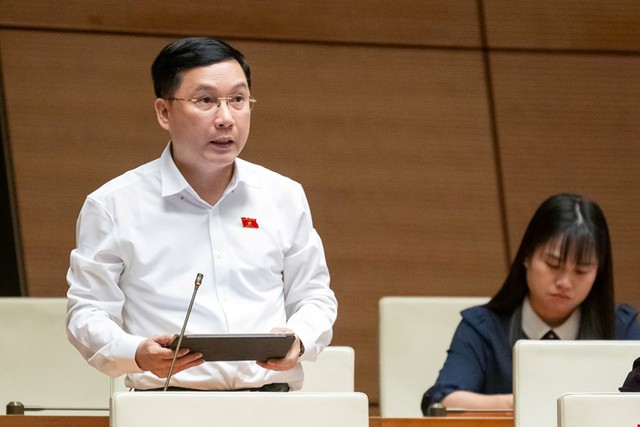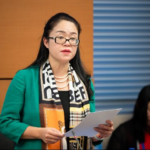During the May 9 hall discussion on the Law on Special Consumption Tax (amended), delegate Le Hoang Anh, a full-time member of the National Assembly’s Committee for Economy and Finance, disagreed with the proposal to reduce the special consumption tax rate for beverages that meet the Vietnamese standard (TCVN) with a sugar content of over 5g/100ml to 8%, effective from 2027, and to increase it to 10% in 2028.

Delegate Le Hoang Anh speaks at the hall. Photo: Pham Thang
According to Mr. Le Hoang Anh, postponing the implementation and reducing the tax rate are not in line with the goal of building the draft law and the directions of General Secretary To Lam in the Office of the Party Central Committee’s Notice 176 on prioritizing the health and healthcare of the people.
“The argument that a 10% tax will affect growth is only valid under ideal conditions, while Vietnam is facing a silent pandemic of non-communicable diseases,” said delegate Le Hoang Anh.
The delegate also expressed concern about the fact that currently, more than 21 million adults in Vietnam suffer from cardiovascular diseases, equivalent to almost a quarter of the country’s population. Among them, 200,000 people die each year from this disease. More than 5 million Vietnamese people live with diabetes, and 40% of urban children are overweight or obese.
“Sugary drinks have little nutritional value but are consumed in increasing quantities, posing a risk of cancer. As of 2024, Vietnam has more than 360,000 people sentenced to death from cancer, with about 180,000 new cases per year, of which more than 120,000 die. The cancer death rate is more than 73.5%, much higher than the global average,” said the delegate from Gia Lai province.
Meanwhile, the consumption of sugary drinks in Vietnam has increased dramatically, from 1.59 billion liters in 2009 to 6.67 billion liters in 2023, a corresponding increase of 420%.
According to delegate Le Hoang Anh, this is not just a tax policy but also a strategic choice for responsible nations. He also mentioned that some countries in the region have strong tax policies on this item. Thailand, for example, imposed a tax in 2017, after which consumption of these products decreased. The Philippines and Malaysia collect billions of dollars in taxes on these drinks and have seen a reduction in diseases, while Brunei imposes a higher tax than Vietnam.
“If we don’t take action today, we will have to pay the price tomorrow with our healthcare budget,” the delegate worried, emphasizing that imposing a strong enough tax is also in line with Vietnam’s international commitments on sustainable development.
Therefore, he proposed maintaining the tax rate at 10% instead of reducing it to 8% and not postponing the implementation, making it effective from 2026. “This is not just about sugar; it’s about morality. Behind an appealing product lies the health consequences and sad stories about the environment. This is not just an issue for the healthcare sector, tax policies to increase the budget and adjust consumer behavior, but also a reminder of the moral responsibility of individuals, businesses, and the entire political system,” said delegate Le Hoang Anh.
The delegate also emphasized that this tax policy is not about prohibition but about creating incentives for making healthier choices. The above-mentioned special consumption tax policy on sugary drinks will contribute to reducing diseases and the burden on the healthcare system.
Emphasizing that products related to human health, especially children’s health, require necessary restrictions, delegate Ta Van Ha, Vice Chairman of the National Assembly’s Committee for Culture and Society, suggested that regulations should be carefully evaluated.
Regarding the draft law, with the tax policy on sugary drinks, Mr. Ha observed that the impact assessment was not thorough enough. “Although in terms of policy, we need to build such a policy, it must be based on sufficient legal, scientific, and practical foundations,” said delegate Ta Van Ha. He requested a comprehensive evaluation from the perspective of consumers, businesses, and the state.
In his explanation and clarification on this issue, Minister of Finance Nguyen Van Thang stated that the World Health Organization (WHO) has recommended imposing a special consumption tax to reduce the consumption of sugary drinks, and reports from the Ministry of Health also indicate the necessity of implementing this policy.
The Minister also cited data showing that six ASEAN countries have imposed special consumption taxes on sugary drinks. The leader of the Ministry of Finance argued that Vietnam needs to implement the special consumption tax on sugary drinks sooner, and it is already late to introduce this policy now.
Pharmacist Long Chau joins Boehringer Ingelheim’s global training program
Over 150 pharmacists from the FPT Long Chau pharmacy chain participated in a specialized knowledge workshop for healthcare professionals that was standardized and taught in multiple countries.



















